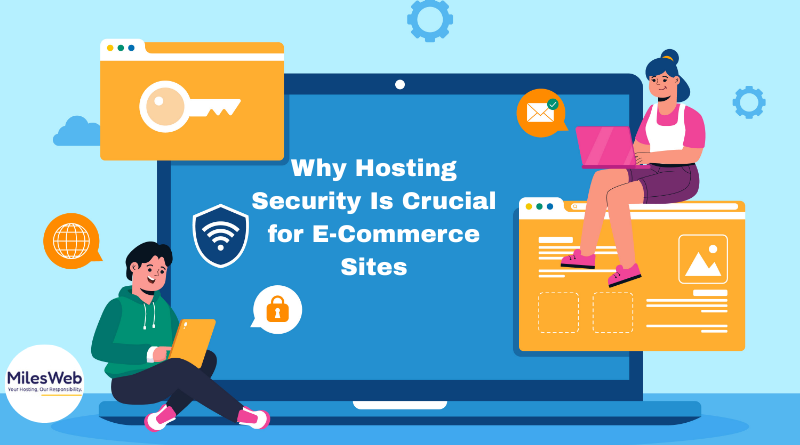Why Hosting Security Is Crucial for E-Commerce Sites
Operating an e-commerce store means you are doing more than selling goods. You are building trust with customers with every interaction. In the digital world, losing trust can happen due to a data breach or lapse in security.
Your online store’s security is anchored to the type of e-commerce hosting services you use. For advanced features, web owners pick particular services like Node.js hosting and run their websites smoothly. An online store needs high security to minimize the risk. Inadequate security measures not only show low revenue but also pose a threat to your online presence. Let us discuss why hosting security is crucial.
The Stakes Are Higher for E-Commerce
E-commerce sites have it hard because trust can easily be broken with a data breach, reputation, or security incident.
Storing payment details, names, and addresses all add to sensitive customer data. Customers expect services to be operational for secure transactions at all times. Other services like Payment gateways claiming transactions in real-time also expect quality service. All of this involves constant data transfers.
Missing a payment or losing a transaction is common for most websites, but for e-commerce sites, the stakes are higher. Providing a constant flow of services becomes an expectation; uptime becomes a basic service. Without secure hosting, sensitive data could be at risk. Failing to provide security means having to deal with backlash on brand image, losing trust, and in some cases, facing litigation. In the end, secure hosting services aren’t a choice; they are a requirement.
E-Commerce Sites’ Real-World Risks
Cybercriminals pose a significant threat to e-commerce sites. Here are some of the most notable concerns:
1. Data Breaches
Hackers are always on the lookout for weak points in a business’s hosting infrastructure to harvest credit cards, logins, or customers’ data.
For instance, the 2020 Magento hack compromised thousands of online stores, resulting in the theft of sensitive payment information.
2. DDoS Attacks
A distributed denial of service (DDoS) attack inundates your site with traffic, causing sluggishness or a complete stall. For e-commerce businesses, site downtime during sales events can cost thousands in unrealized revenue.
3. Malware Infections
With malware, the possibilities are endless. It can redirect customers to phishing pages, steal your stored data, or worse, inject malicious code into your site and, with time, redirect customers to phishing pages or steal data you store, all without detection.
4. Ransomware
This can act like a nightmare for online businesses, where some attackers will lock you out of your own server and demand payments to restore access.
How Secure Hosting Protects E-Commerce Sites
E-commerce businesses are better off with hosting providers that offer added layers of protection, which safeguard a store.
● 1. SSL Certificates
With a secure sockets layer enabled, data SSL (credit card information, logins, and payment details) is exchanged between customers and your website, protecting them. SSL Certificates are a must for PCI compliance.
● 2. Firewalls
A website application firewall (WAF) prevents threats by filtering out harmful traffic before it reaches your website.
● 3. Regular Backups
The best secure hosting provides automated backups, making it easy to recover your website after sustaining cyberattacks or losing data due to other unforeseen circumstances.
● 4. Malware Scanning & Removal
Using automation, scans can identify malware, letting the hosting team remove the threats before any real damage occurs.
● 5. DDoS Protection
The more sophisticated hosting configurations come equipped with anti-DDoS systems capable of identifying and eliminating attack traffic without harming real users.
● 6. Server Isolation
With VPS or dedicated servers, other users on the same server cannot compromise your site’s resources and data due to server isolation.
Why Choosing the Right Hosting Provider Matters
Your website can be well-designed and the CMS updated regularly, but everything can be undone by poor hosting security. Consider the features below when looking for an e-commerce hosting provider.
- Proactive security monitoring
- 24/7 technical support
- Automatic software updates
- Compliance with PCI DSS standards
- Data center security (both digital and physical)
Security = Trust = Sales.
In e-commerce, your hosting environment can either be a boon or a bane in marketing your business. It is best to make sure to provide a business strategy that leaves customers with faith in a store.
If signing up and ordering allows the customer to have a sense of security, it is guaranteed that they will be more likely to purchase. Trust can further be amplified to provide users with a sense of assurance that,
Your data is being secured and will not get leaked.
Key Reflections
Your e-commerce hosting is much more than where your site is stored; it is also a fortress that protects your business, your customers, and your reputation. Secure hosting like MilesWeb is the backbone of a successful online shop, from protecting the store against cyberattacks to complying with industry regulations.
Do not skimp on hosting security. The prevention cost is much more economical than the damage costs that arise after a breach occurs.


Leave a Reply